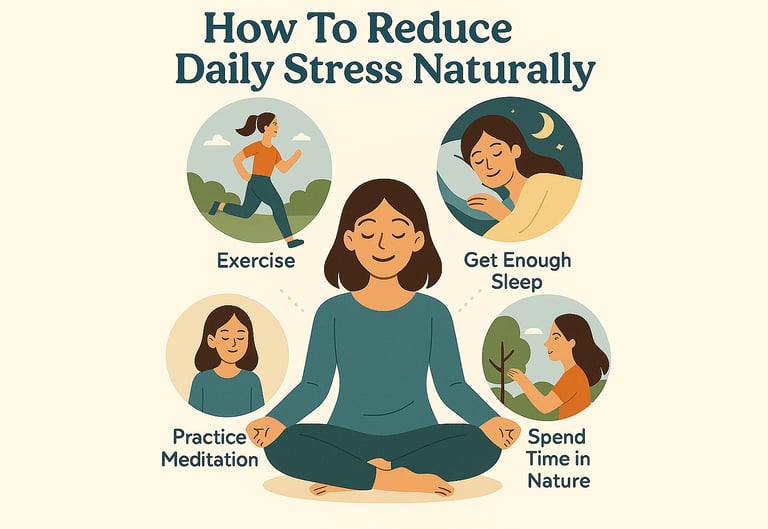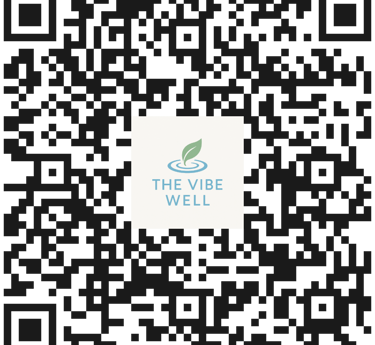✨ Kickstart Your Wellness Journey — Download the Free Detox Guide
How to Reduce Daily Stress Naturally: Mindfulness & Anxiety Relief Without Medication
Discover natural ways to reduce stress and manage anxiety without medication. Learn beginner-friendly mindfulness techniques, calming breathing exercises, and simple daily habits to feel more balanced, focused, and calm, all backed by science and easy to start today.
BLOG
The Vibe Well Team
8/3/20256 min read


Stress & Anxiety Management: How to Reduce Daily Stress Naturally and Manage Anxiety Without Medication
Stress and anxiety are part and parcel of modern life, but they don’t have to dominate your day-to-day wellbeing. Learning how to reduce stress naturally and manage anxiety without medication can transform your mental and physical health. This comprehensive guide will walk you through effective techniques, including mindfulness and meditation for beginners, alongside practical, science-backed strategies to calm your mind and body.
Understanding Stress and Anxiety
Before diving into solutions, it’s important to understand the difference between stress and anxiety and how they affect us.
Stress is the body’s response to an external challenge or demand. It’s often triggered by specific situations, like work deadlines, financial pressure, or relationship issues. Stress can be acute (short-term) or chronic (long-lasting).
Anxiety is a feeling of worry, nervousness, or fear that can be more persistent and sometimes occur without an obvious trigger. Anxiety can become overwhelming and interfere with daily life.
Both stress and anxiety trigger the “fight or flight” response in our nervous system, releasing hormones like cortisol and adrenaline. While this response is useful in emergencies, chronic activation can harm health, causing headaches, fatigue, digestive issues, and even weakening the immune system.
The good news? There are many natural, effective ways to reduce stress and manage anxiety.
How to Reduce Daily Stress Naturally
1. Prioritise Movement and Exercise
Physical activity is one of the best natural stress busters. Exercise releases endorphins — chemicals in the brain that act as natural painkillers and mood elevators.
Aim for at least 30 minutes of moderate exercise most days. This could be walking, yoga, swimming, cycling, or dancing.
Even a short 5–10 minute walk outdoors during a stressful day can help clear your mind.
Yoga and tai chi combine movement with breathing and mindfulness, enhancing stress relief.
2. Practise Deep Breathing
Deep, slow breathing activates the parasympathetic nervous system, which calms the body and reduces the stress response.
Try this simple technique:
Sit comfortably, close your eyes.
Inhale slowly through your nose for 4 seconds.
Hold your breath for 7 seconds.
Exhale slowly through your mouth for 8 seconds.
Repeat 4–5 times.
This “4–7–8” breath can reduce heart rate and lower cortisol levels almost immediately.
3. Get Enough Sleep
Stress and sleep have a two-way relationship: stress can disrupt sleep, and poor sleep increases stress vulnerability.
Aim for 7–9 hours of quality sleep per night.
Create a calming bedtime routine: limit screen time an hour before bed, avoid caffeine in the late afternoon, keep your room dark and cool.
Try herbal teas such as camomile or valerian root to relax before sleep.
4. Connect with Nature
Spending time outdoors has been shown to reduce cortisol levels and improve mood.
Take a walk in a park or woodland.
Practise “forest bathing”, simply being mindful of the sights, sounds, and smells of the natural world.
Even tending to indoor plants or a small garden can help.
5. Limit Stimulants and Alcohol
Caffeine and nicotine can heighten anxiety and disrupt sleep.
Alcohol may seem relaxing initially but often worsens anxiety over time.
Opt for herbal teas or water infused with lemon, cucumber, or mint instead.
6. Prioritise Healthy Nutrition
Your brain and body need nutrients to manage stress effectively.
Eat a balanced diet rich in fruit, vegetables, wholegrains, and lean protein.
Foods high in magnesium (nuts, seeds, leafy greens) and omega-3 fatty acids (fatty fish, flaxseeds) support brain health.
Avoid excessive sugar and processed foods that can cause mood swings and energy crashes.
Mindfulness and Meditation Techniques for Beginners
Mindfulness and meditation are powerful tools to manage stress and anxiety. They train your brain to focus on the present moment, reducing rumination and worry.
What is Mindfulness?
Mindfulness is the practice of paying attention to your thoughts, feelings, and sensations without judgement. It helps you become aware of stress triggers and respond more calmly.
Beginner Mindfulness Exercises
1. Mindful Breathing
Sit quietly and focus on your breath.
Notice the sensation of air entering and leaving your nostrils.
When your mind wanders, gently bring your attention back to your breath.
Practise for 5–10 minutes daily.
2. Body Scan
Lie down or sit comfortably.
Slowly focus your attention on different parts of your body, starting from your toes up to your head.
Notice any tension or discomfort without trying to change it.
This practice helps you connect with your body and release stored tension.
3. Mindful Observation
Choose an object (a flower, a candle flame, or a piece of fruit).
Spend several minutes observing it closely.
Notice colours, textures, shapes, and any thoughts or feelings that arise.
This anchors your mind in the present moment.
Meditation Techniques
If you’re new to meditation, here are some simple ways to start:
Guided Meditation
Use apps like Headspace, Calm, or Insight Timer, which offer beginner-friendly guided sessions.
Guided meditation helps by providing instructions and keeping your focus.
Loving-Kindness Meditation (Metta)
Sit quietly and silently repeat phrases such as:
“May I be happy.”
“May I be healthy.”
“May I be free from suffering.”
Then extend these wishes to others: loved ones, acquaintances, even difficult people.
This practice promotes compassion and reduces anxiety.
Mantra Meditation
Choose a calming word or phrase, such as “peace” or “I am calm.”
Repeat it silently during meditation.
This can help distract from anxious thoughts and promote focus.
Practical Tips to Manage Anxiety Without Medication
While medication can be helpful for some, many people want to explore natural ways to manage anxiety. Here are evidence-based tips:
1. Establish a Routine
Anxiety often worsens with uncertainty and lack of structure.
Set regular times for waking up, meals, work, and relaxation.
Predictability helps your brain feel safer and more grounded.
2. Challenge Negative Thoughts
Anxiety feeds on catastrophic thinking and “what if” scenarios.
Practise cognitive restructuring: notice negative thoughts, question their accuracy, and replace them with more balanced alternatives.
For example, instead of “I will fail,” think, “I will do my best, and that’s enough.”
3. Limit News and Social Media Intake
Constant exposure to negative news and social media can amplify anxiety.
Set specific times to check news, avoid doom scrolling.
Follow accounts that inspire and uplift you.
4. Use Grounding Techniques
Grounding techniques help you stay connected to the present moment during anxious episodes.
Try this 5–4–3–2–1 method:
Identify 5 things you can see.
Identify 4 things you can touch.
Identify 3 things you can hear.
Identify 2 things you can smell.
Identify 1 thing you can taste.
This sensory exercise distracts your mind from anxious thoughts.
5. Stay Socially Connected
Social support is crucial for mental health.
Talk with trusted friends or family about your feelings.
Join support groups or wellness communities online or offline.
Volunteering or helping others can boost your mood and reduce anxiety.
6. Engage in Creative Activities
Creative outlets like painting, writing, music, or gardening help express emotions and reduce anxiety.
Find activities that feel fun and fulfilling.
Don’t aim for perfection; focus on the process.
7. Try Herbal Supplements (With Caution)
Certain natural supplements have shown promise for anxiety relief, but always consult a healthcare professional first.
Ashwagandha: apoptogenic herb known to reduce cortisol.
L-theanine: amino acid found in green tea that promotes relaxation.
Passionflower and Valerian root: traditionally used for anxiety and sleep.
When to Seek Professional Help
If anxiety or stress becomes overwhelming or persistent despite these natural methods, consider consulting a healthcare provider or mental health professional.
Symptoms such as panic attacks, severe depression, suicidal thoughts, or inability to function daily need immediate attention.
Therapy options like cognitive behavioural therapy (CBT) are highly effective.
Medication might be necessary in some cases and can be combined with natural strategies.
Summary: Your Daily Stress and Anxiety Toolkit
Here’s a quick daily checklist to help you manage stress and anxiety naturally:
☑️ Move your body (walk, yoga, dance)
☑️ Practise deep breathing or mindfulness meditation for 5–10 minutes
☑️ Prioritise 7–9 hours of quality sleep
☑️ Eat a balanced diet rich in whole foods and limit caffeine/alcohol
☑️ Spend time outdoors or connect with nature
☑️ Use grounding techniques during anxious moments
☑️ Limit news and social media exposure
☑️ Stay socially connected and express yourself creatively
Final Thoughts
Stress and anxiety are natural, but chronic levels can disrupt your life. The good news is, with daily practice of natural stress-reduction methods, mindfulness, and practical anxiety management techniques, you can regain control over your mental wellbeing, without relying solely on medication.
Start small. Pick one or two techniques that resonate with you, and gradually build your own personalised toolkit for calm and resilience.
Remember, your mind and body are interconnected. Caring for both with kindness and patience is the key to lasting wellness.
✨ Want to Go Deeper?
If you found this guide helpful, you’ll love our ebooks:
🧘♀️ Quiet the Mind: Mindfulness Strategies for Overthinkers
Learn how to break free from mental clutter, stop rumination, and find calm using simple, science-backed tools.
🌿 5 Essential Wellness Supplements to Boost Your Health Naturally
Discover how the right nutrients can help regulate stress, improve sleep, and support your mood naturally.
The Vibe Well
The Vibe Well is your go-to space for natural wellness, faceless health courses, and everyday inspiration to feel your best.
© 2025. All rights reserved.


